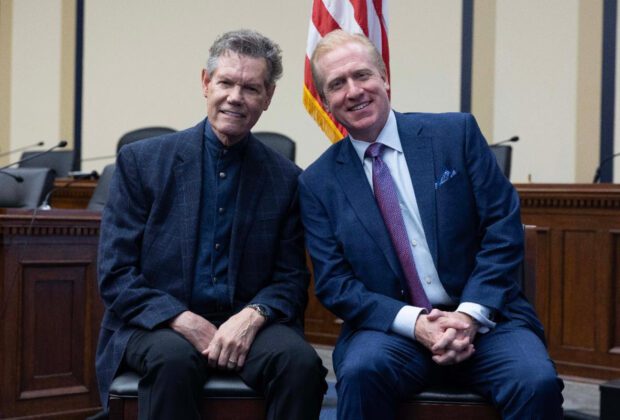Country music legend Randy Travis and SoundExchange CEO Michael Huppe just prior to their testimony on Capitol Hill yesterday. Photo by Tom Brenner.
On June 26, SoundExchange CEO and President Michael Huppe and country music icon Randy Travis testified before Congress on the American Music Fairness Act (H.R. 791), which would require AM/FM radio stations to pay artists royalties when their songs are played on the air.
In his testimony at a hearing of the House Judiciary Committee’s Subcommittee on Courts, Intellectual Property, and the Internet, SoundExchange CEO and President Michael Huppe highlighted that the U.S. is the only democratic nation in the world without a performance right for artists on AM/FM radio and advocated for Congress to modernize the nation’s copyright law to protect creators.
Huppe said, “Congress must set a standard that creators need to be compensated wherever and whenever their music is played – especially when their creations form the backbone of the business model like they do for AM/FM radio.”
Huppe also underscored how the current system harms artists domestically and overseas: “American musicians lose almost $300 million of taxable U.S. income each year because we lack these protections in the U.S. – this is on top of the hundreds of millions of dollars they are already missing out on domestically.”
Country music star Randy Travis also provided testimony during the hearing on behalf of creators. Randy’s remarks (delivered by his wife Mary) emphasized the need to provide fair compensation for artists who form the backbone of the music industry.
Mary Travis said, "Music is, was, and will always be his lifeline. But that lifeline has changed. And we need to acknowledge that. The days of Randy packing a car and trekking thousands of miles across the country to visit radio stations and deliver copies of his newest cuts on cassette, in hopes of having his music heard, are a thing of the past.
Of all the things we do differently than we did a century ago, one thing remains the same—the voice is still the mandatory bridge between the writer and the listener. And it's time to do right by the ones that create the sound, the melody, the emotion that keeps the listeners coming back and the advertisers buying in."
In 2013, Travis was hospitalized with viral cardiomyopathy and now suffers from aphasia, making it difficult to speak and sing. Earlier this year, Travis demonstrated how artificial intelligence can be a powerful tool in support of creators by using an AI model to release a new song, called "Where That Came From.”
Today, Randy and Mary Travis joined ABC’s Good Morning America to share more about his journey, the importance of the American Music Fairness Act, and how AI can positively impact the music industry with the right protections in place.
Full witness testimony as well as a video of the hearing is available at judiciary.house.gov.














